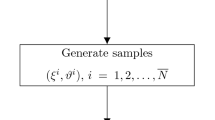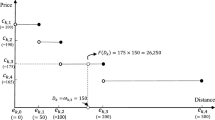Abstract
Many large shippers procure truckload (TL) service from carriers via a combinatorial auction. In order to determine the winners of the auction, they need to solve a combinatorial optimization problem known as winner determination problem (WDP). In practice, shippers must resolve the WDP under shipment volume uncertainty due to limited information of future demands. In this paper, we propose a sampling-based two-stage stochastic programming approach to solve WDP under shipment volume uncertainty. We propose a refined formulation of deterministic WDPs in which shortage in shipments and the associated penalty cost are explicitly modeled. We demonstrate that the refined model is more general and more feasible under uncertainty than the benchmarks. Theoretical results pertaining to problem feasibility are derived and their insights to TL service procurement are provided. We propose a sampling-based solution approach called Monte Carlo Approximation (MCA) and use numerical tests to show that MCA is numerically tractable for solving moderately sized instances of TL service procurement. Finally, we verify via Monte Carlo simulation that the solution to our proposed stochastic WDP yields lower procurement cost than the solution to the deterministic WDP.



Similar content being viewed by others
Notes
A contract period in the transportation service market is usually a year according to Sheffi (2004).
The bidder can submit multiple bids but obtain at most one of them (Nisan 2006).
Note that the superscript n for variables does not denote the power but an index.
We use the third standardized moment to measure the skewness of distribution. In all beta distributions used in the second experiment, we set α = 0.5.
References
Ackermann H, Ewe H, Kopfer H, Küfer K-H (2011) Combinatorial auctions in freight logistics. In: Böse JW, Hu H, Jahn C, Shi X, Stahlbock R, Voß S (eds) Computational logistics. Springer, Berlin, pp 1–17
Ahmed S, Shapiro A (2002) The sample average approximation method for stochastic programs with integer recourse. http://www2.isye.gatech.edu/people/faculty/Shabbir_Ahmed/saasip.pdf. Accessed 4 July 2012
Ballou RH (1992) Business logistics management. Prentice Hall
Birge JR, Louveaux F (1997) Introduction to stochastic programming. Springer
Boutilier C, Sandholm T, Shields R (2004) Eliciting bid taker non-price preferences in (combinatorial) auctions. Proc Ninet Natl Conf Artif Intell (AAAI-04):204–211
Caplice C (2007) Electronic markets for truckload transportation. Prod Oper Manag 16:423–436
Caplice C, Sheffi Y (2003) Optimization-based procurement for transportation services. J Bus Logist 24:109–128
Chang T-S (2009) Decision support for truckload carriers in one-shot combinatorial auctions. Transp Res B 43:522–541
Chen RL, AhmadBeygi S, Cohn A, Beil DR, Sinha A (2009) Solving truckload procurement auctions over an exponential number of bundles. Transp Sci 43:493–510
de Vries S, Vohra RV (2003) Combinatorial auctions: a survey. INFORMS J Comput 15:284–309
Elmaghraby W, Keskinocak P (2004) Combinatorial auctions in procurement. In: Harrison TP, Lee HL, Neal JJ (eds) The practice of supply chain management: where theory and application converge. Springer, New York, pp 245–258
Gloaguen C, Fleischer F, Schmidt H, Schmidt V (2010) Analysis of shortest paths and subscriber line lengths in telecommunication access networks. Netw Spat Econ 10:15–47
Huang GQ, Xu SX (2013) Truthful multi-unit transportation procurement auctions for logistics e-marketplaces. Transp Res B 47:127–148
Jara-Diaz SR (1988) Multioutput analysis of trucking operations using spatially disaggregated flows. Transp Res B 22:159–171
Kameshwaran S, Benyoucef L (2009) Optimization based e-sourcing. In: Huo Y, Jia F (eds) Supply chain the way to flat organisation. InTech, Vienna, pp 73–102
Kleywegt AJ, Shapiro A, Homen-De-Mello T (2001) The sample average approximation method for stochastic discrete optimization. SIAM J Optim 12:479–502
Lee C-G, Kwon RH, Ma Z (2007) A carrier’s optimal bid determination problem in combinatorial auction for transportation procurement. Transp Res E 43:173–191
Lehmann D, Müller R, Sandholm T (2006) The winner determination problem. In: Cramton P, Shoham Y, Steinberg R (eds) Combinatorial auctions. MIT Press, pp 297–318
Li Z-C, Lam WHK, Wong SC, Huang H-J, Zhu D-L (2008) Reliability evaluation for stochastic and time-dependent networks with multiple parking facilities. Netw Spat Econ 8:355–381
Ma Z (2008) Combinatorial auctions for truckload transportation procurement. Dissertation, University of Toronto
Ma Z, Kwon RH, Lee C-G (2010) A stochastic programming winner determination model for truckload procurement under shipment uncertainty. Transp Res E 46:49–60
Metropolis N, Ulam S (1949) The Monte Carlo method. J Am Stat Assoc 44:335–341
Nisan N (2006) Bidding languages for combinatorial auctions. In: Cramton P, Shoham Y, Steinberg R (eds) Combinatorial auctions. MIT Press, pp 215–232
Remli N, Rekik M (2012) A robust winner determination problem for combinatorial transportation auctions under uncertain shipment volumes. Laval University
Rothkopf MH, Pekec A, Harstad RM (1998) Computationally manageable combinatorial auctions. Manag Sci 44:1131–1147
Sheffi Y (2004) Combinatorial auctions in the procurement of transportation services. Interfaces 34:245–252
Song J, Regan A (2003) Combinatorial auctions for trucking service procurement: the carrier perspective. Transp Res Rec 1833:40–46
Sumalee A, Kurauchi F (2006) Network capacity reliability analysis considering traffic regulation after a major disaster. Netw Spat Econ 6:205–219
Author information
Authors and Affiliations
Corresponding author
Appendices
Appendix A: Proof of Proposition 1
Given the definition of J + and constraints (7), (13) and (18), we have \( \begin{array}{ll}{\displaystyle \sum_{k\in {K}_j}{x}_{jk}}=1,\hfill & \forall j\in {J}^{+}\hfill \end{array} \). Further, \( {\displaystyle \sum_{j\in {J}^{+}}{\displaystyle \sum_{k\in {K}_j}{x}_{jk}=\left|{J}^{+}\right|}} \). If N max < |J +|, constraint (14) will be violated and c-WDP becomes infeasible.
Appendix B: Proof of Proposition 2
Let’s denote the first-stage solution that is feasible to s-WDP by \( {\overline{x}}_{jk},\forall j\in J,\forall k\in {K}_j \). Note that although constraints (23) and (24) do not contain a first-stage decision variable, Proposition 1 shows that a feasible first-stage solution may not exist if the parameters in these constraints are not carefully evaluated. Therefore, if there exists a feasible first-stage solution to s-WDP, we should also have \( {y}_{jk}\left(\tilde{\mathbf{d}}\right)={\overline{y}}_{jk},\forall j\in J,\forall k\in {K}_j \) so that constraints (21)–(25) are satisfied. Then it is trivial that the following solution is always feasible to s-WDP:
where
The proposition is proven.
Rights and permissions
About this article
Cite this article
Zhang, B., Ding, H., Li, H. et al. A Sampling-Based Stochastic Winner Determination Model for Truckload Service Procurement. Netw Spat Econ 14, 159–181 (2014). https://doi.org/10.1007/s11067-013-9214-6
Published:
Issue Date:
DOI: https://doi.org/10.1007/s11067-013-9214-6




